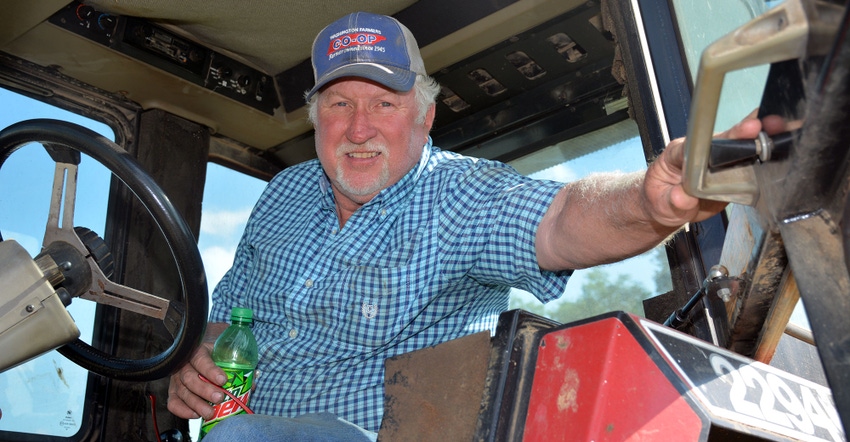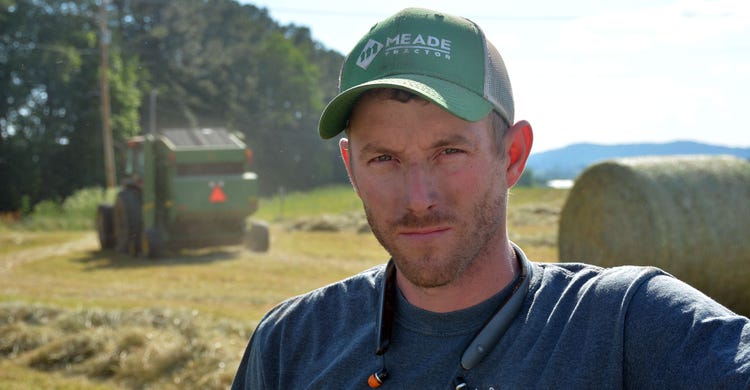
The COVID-19 pandemic has caused little more than inconvenience to Washington County, Tenn., farmer Joe Shell.
Markets and weather, however, create hardships as he and his son, David, go about the business of managing a grain, hay and livestock operation in Washington County, Tenn.
The Shells farm just a few miles west of Jonesborough, nicknamed "the oldest town in Tennessee."
"The virus has not affected us," Joe says as steps down from the tractor pulling one of two round balers he and his son are running to harvest part of the 1,000 bales of hay they'll put up this summer.
"We have had a little difficulty getting parts, but the virus has not affected what we do," he says. "Not many people come around out here. We have to manage the cattle, bale hay and plant corn and soybeans, so it has not affected what we do."

David Shell
Weather delays
Weather has. Shell says persistent rain last fall hampered corn and soybean harvest. Weather also affected spring planting.
"Last fall was a mess," he says. Harvest was stretched to just before Thanksgiving, leaving little opportunity to plant wheat and grass for straw.
"Our busiest times are October and November and now, the last three weeks in April and into June."
It's been a wet spring. He took advantage of a five-day dry spell to cut and bale hay. "We're cutting a wheat field we planted late and has a lot of ryegrass. It's not very good for grain but it is making good hay and we need the hay." In addition to the hay and row crops they manage 150 mama cows.
Shell says they will plant soybeans into July. "We were late planting corn. We're done, but we just quit, since I don't like to plant corn past May 25. If I could sell corn for $6 or $7, I'd be all over it, but I'm not anxious to plant corn this late at $3 to $3.50.
"I hope after the virus is gone beef prices will go back up and corn will, too. But they've been saying for three years that cattle will go up. I'm still waiting."
More soybeans
He says corn acreage he couldn't plant he'll put in soybeans. "The price of soybeans is not much better," he says, "but they are not as expensive to grow."
He's looking for other ways to manage costs. "Until two years ago, we grew tobacco," he says. "Now, I'm looking for options that require less help."
He used the H-2A program to help work tobacco, which requires a lot of manual labor. "I didn't need a lot of labor, but the government paperwork was a lot of work."
With grain, cattle and hay, he relies more on mechanical options. "I bought an extra round baler, so we can get the work done quickly with just me, my son and one other hand, maybe a little more help as needed."
Straw market
Shell says the straw business is important. "We will make about 10,000 bales of straw," he says. It's been a mainstay of the operation for years. Shell says his dad started selling straw back in the 1950s. "It was not as big an industry then as it is now," he says. Construction and roadside seeding projects provide consistent markets for straw.
Farming has been a family tradition for several generations. Shell says the original family farm still operating in Carter County is nine years from earning Century Farm status.
The commitment to agriculture continues. Shell says his wife, Lisa, has a seeding business and uses straw from the farm.
His daughter, Julia, has a degree in agriculture from the University of Arkansas and works for a farm supply company.
David earned a degree in nuclear engineering from the University of Tennessee but passed up opportunities in that field to come back to the farm.
"Being able to work outside has an appeal," Joe says as he heads back to the tractor.
He and David line the balers up on alternate windrows and work their way along the field edge, stopping frequently to drop a round bale.
"It's good hay," David says after completing a circuit of the field and shutting down to go get more diesel.
About the Author(s)
You May Also Like






